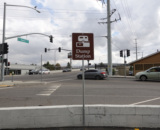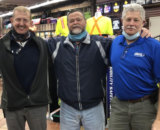Whether it is regularly scheduled preventative maintenance, last-minute repairs or roadside service, the nation's professional drivers rely on the shops at truckstops and travel plazas to keep their equipment running. Highway Business Matters talked with shop operators to learn their top challenges, opportunities and needs, which can help industry suppliers uncover new opportunities within locations' shops.
John Pedersen, shop general manager at Rochelle Travel Plaza in Rochelle, Ill., said fleets are going longer between oil changes and examining all shop expenses with a fine-tooth comb. "Now drivers have to wait for authorization on repairs that we used to do automatically," he said.
Michael Gay, vice president of shop programs for Professional Transportation Partners, said even though fleets and drivers are extending their drains, they're still maintaining their equipment with regular service required by the Department of Transportation. "The key is to build customer loyalty to get repeat business. If you can, it will help you recoup some of your loss," he said.
In addition to extending drains, fleets are also keeping equipment longer, which means it will need more maintenance than newer models.
Tommy Davis, vice president of service centers for AMBEST, said shop sales are slowly starting to pick up. "We're seeing some increase in same month, same store sales for this year over last year for the most part. Things aren't jumping through the roof, but we are seeing moderate increases," he said.
Drivers are still concerned over prices and aren't shy about letting operators know. Allen Burns, general manager of West Winds Truck Stop in Green River, Utah, said, "The tire prices and the oil prices have gone through the roof, so we're hearing a lot of complaints about that."
Despite concerns over costs, shop operators said there are still opportunities for upselling. Burns said the best method is to provide a thorough inspection and alert drivers to potential problems. "It is a win-win if you can see something that is going to go. The driver might avoid a more expensive repair later and we might be able to get extra work," he said.
Offering variety can also increase the amount and types of products customers buy. "You have so many facets of customers coming through and they want different things," Gay said. "You can't just carry one brand of something."
The new safety protocol Comprehensive Safety Analysis 2010 (CSA 2010) that will take effect nationwide later this year may also provide additional opportunities for shops. CSA 2010 could boost over-the-road repairs and also provides an opportunity for overall customer service.
"There seems to be tremendous confusion and disinformation among the drivers," Davis said. "We've been on an educational campaign for the past three or four months and we have posters up in the locations to spark a conversation between technicians and drivers about CSA 2010." Learn more about CSA 2010 in this previous HBM article.
In order to provide the best service, shops nationwide are working to find the most qualified technicians. "There isn't an overall technician shortage, but there is almost always a short supply of high quality technicians," Davis said. He noted that the current job market has allowed many shops to pick up quality technicians over the past six months.
Qualified technicians can help alleviate what is often the top concern for shop operators: liability. "If you're employees aren't trained correctly or they make a mistake, you could be responsible," Burns said. To reduce the risk of mistakes, Burns sends his technicians to training regularly and holds safety meetings.
{HBM} Highway Business Matters is a brief semi-monthly newsletter created exclusively for companies that provide products or services to the truckstop and travel plaza industry. Highway Business Matters will keep you informed on trends, tactics, and tips to help you connect to the $65 billion truckstop and travel plaza industry.
Help tailor Highway Business Matters to meet your needs by sharing your feedback and story ideas. Send your input to: atoner@natso.com.
Subscribe to Updates
NATSO provides a breadth of information created to strengthen travel plazas’ ability to meet the needs of the travelling public in an age of disruption. This includes knowledge filled blog posts, articles and publications. If you would like to receive a digest of blog post and articles directly in your inbox, please provide your name, email and the frequency of the updates you want to receive the email digest.

